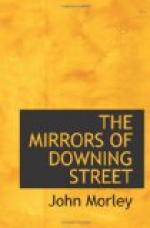I remember being in the House of Commons on an afternoon when Mr. Lloyd George was expected to make an important speech. Lord Robert Cecil sat in a corner seat on the back benches; his brother, Lord Hugh, occupied the corner seat on the front bench below the gangway. During the Prime Minister’s speech, which was a succession of small scoring points against the Labour Party delivered with that spirit of cocksureness which has grown with him in the last few years, I noticed Lord Robert make a pencilled note on a slip of paper and pass it across the gangway with a nod of his head toward Lord Hugh. I watched the journey of this little paper and watched to see its effect. Lord Hugh unfolded the slip of paper, read it, smiled very boyishly all over his face, and, folding it up again, slowly turned his head and looked back towards his brother. The smile they exchanged was a Cecilian biography. One saw in the light of that instant and whole-hearted smile the danger of a keen sense of ironical humour. Both these men have the making of creative fanatics; in both of them there is an intense moral earnestness and in both great intellectual power; but nature has mixed up with these gifts, which were intended for mankind, a drollery of spirit, only amusing in the confidence of private life which they have allowed to weaken their sincerities. Humanity may be thankful that St. Paul was without a sense of humour.
During the war, as Minister of Blockade, Lord Robert Cecil rendered services of the greatest magnitude to his countrymen: he kept Sweden out of the war when the Russian Foreign Office could hardly breathe for anxiety on this point, and at a time when many British newspapers were doing their best to facilitate the great desire of Germany to march an army through Sweden and Finland to the thus easily reached Russian capital. His work, too, at the Peace Conference in Paris entitles him to the gratitude of the nation: he kept the idea of the League of Nations alive in an atmosphere that was charged with war. He prevented these conferences from making “a Peace to end Peace.” But on the whole I feel that he is rather the shadow of great statesmanship leaning diffidently over the shoulder of political brute force than the living spirit of great statesmanship leading the moral conscience of the world away from barbarism towards nobler reason and less partial truth.
MR. WINSTON CHURCHILL
MR. WINSTON CHURCHILL
The Rt. Hon. Winston Churchill (Leonard Spencer) son of Lord Randolph Churchill. Born, 1874. Educ: Harrow and Sandhurst. Entered army in 1895; served with Spanish Forces in Cuba, 1895; in operations in India, 1897-98; on the Nile and at the Battle of Khartoum, 1899; was given the Khartoum Medal in that year; Correspondent of the Morning Post in South Africa, 1899-1900; taken prisoner and escaped, 1900; in long series of actions including Spion Kop, Pieters, and




